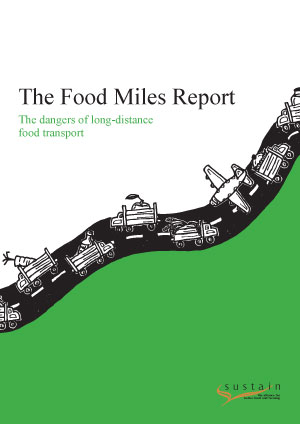The Food Miles Report - the dangers of long-distance food transport
Food is being transported longer and longer distances – 'food miles' – from producer to consumer. In the UK, comparatively little of the food we consume comes from local producers; and much will have been transported over great distances.
Re-print of the original 1994 publication, with an updated cover and foreword.
Cheap non-renewable fossil fuel energy makes intensive agriculture and long-distance transportation economically viable, and has allowed food production and distribution to become global industries. Prices in shops do not reflect the full cradle-to-grave environmental and social costs.
But the concept of food miles isn’t just about distances. This report explores some of the wider social and ecological implications of international food trade, and suggests how to reduce excessive, unnecessary food miles.
Report contents
Foreword to the 2011 reprint of the Food Miles Report
Foreword to the original 1994 Food Miles Report
Summary of the Food Miles Report
- Introduction
- The food miles food chain
- Food Miles: Issues and implications
- Forces behind Food Miles
- Who reaps the profits?
- Reducing Food Miles
- Recommendations
The Food Miles Report: Introduction
1. Food Miles case studies
- Case study 1: rotten apples
- Case study 2: oranges are not the only fruit
- Case study 3: luxury lines in fresh produce
- Case study 4: salad days over for UK producers
- Case study 5: milk – the demise of door-step deliveries
- Case study 6: meat miles
- Case study 7: Chocolate habits
- Case study 8: a fishy business
- Case study 9: the bread-line
- Case study 10: the real cost of strawberry yoghurt
2. The ‘Food Miles’ food chain
- Agricultural production
- Processing, packaging and preservation
- Energy use in the food chain
3. Food Miles: Issues and implications
- Environmental effects
- Small farms and rural communities
- Animal welfare
- Public health
4. Forces behind Food Miles
- Subsidised transport
- Subsidised agriculture
- Retail concentration
- Food manufacturers
- Aid, trade, debt and development
- General Agreement on Tariffs and Trade (GATT)
- Consumer choice and information
- Food From Britain (FFB)
5. Reducing Food Miles
- Agenda 21
- New patterns of consumption
- Local produce buying schemes
- The urban grower
- Fair trade
- The price is right
- The case for sustainable agriculture
- Assistance to developing countries
- Reducing the food deficit
- Supermarkets and food processors
Conclusion
Recommendations
- Action by individuals
- Action by farmers and growers
- Action by food retailers and processors
- Action by local authorities
- Action by national governments
Glossary
Useful addresses
References
Food Facts: A series of short reports on over a dozen different products, shows how people's shopping choices - as well as government policy - can protect the environment, enhance social justice and improve health.
Sustain
The Green House
244-254 Cambridge Heath Road
London E2 9DA
020 3559 6777
sustain@sustainweb.org
Sustain advocates food and agriculture policies and practices that enhance the health and welfare of people and animals, improve the working and living environment, promote equity and enrich society and culture.
© Sustain 2025
Registered charity (no. 1018643)
Data privacy & cookies
Icons by Icons8

